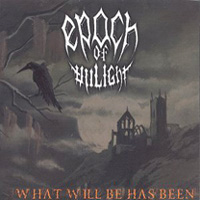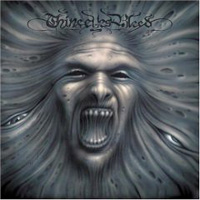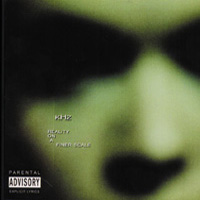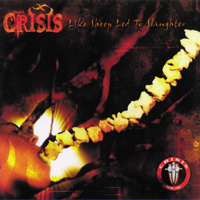 Crisis
Crisis
Like Sheep Led To Slaughter (The End)
An interview with singer Karyn Crisis
by Daniel Lukes
Formed in NYC in 1993, twisted gloom-metallers Crisis are now regarded as something of a legend in extreme metal circles and are certainly one of the true originals of the last decade. Led by Karyn Crisis and her inimitable croon-to-howl vocals and lyrical tales of urban desolation and despair, the quintet, who have since inspired a host of followers, are now back in full force after a lengthy hiatus. Now residing in L.A., Karyn Crisis took the time to answer questions about the insights and burdens of art, the light at the end of the tunnel, and what it feels like to be perennial underdogs.
You guys recently toured with Kittie and Otep. How did that go?
It went really well. It was great for us. We did the Soulfly tour first, and then this one, and both those tours are pretty much the most commercial type tours that Crisis has ever done. We went into the tours knowing that they would be a bit of a challenge, because commercial audiences tend to be less knowledgeable about different types of music, and they tend to like music that’s a little easier to digest, which Crisis is not, but we thought it would be an excellent opportunity.
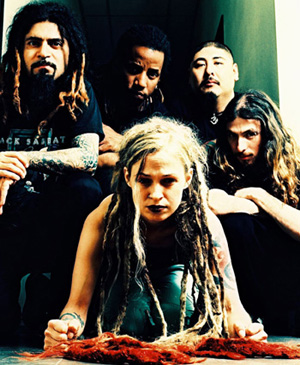 How was it different from other tours?
How was it different from other tours?
It was definitely different from the Soulfly tour in terms of the day-to-day politics of dealing with the other bands’ crews and everything. On the Soulfly tour, there was a beef between Ill Niño and Soulfly, and once Ill Niño was gone, the Soulfly crew tried to mess with us a little bit, they were very invasive, but we kind of quietly stood our ground, and the respect was gained and everything was great from there on out. With the Kittie tour, Kittie’s crew was very gracious, and really accommodating. There really weren’t any egos battling around from the Kittie camp, and the girls were really nice. The only kind of weird thing is that the singer for Otep never once acknowledged Kittie or Crisis from the stage, whereas both of us would say “Good evening, let’s hear it for Kittie, or Otep.” She never once acknowledged any of us, even on the very last day of the tour. I thought that was a little strange.
Crisis were the first band with a female singer in the extreme metal arena: How do you feel about having inspired others to do the same?
It’s a good thing. Back when Crisis started in 1993, we were an anomaly. Not only was metal a dirty word back then, but having a woman fronting a band was even odder, so we had to fight an uphill battle a lot of the time. Not so much with the crowds, but business-wise. We were told, as a band, that we were too extreme, that we wouldn’t get anywhere because we weren’t marketable because of me being the singer. Industry people told us that their target audience was 13 year-old boys who didn’t get into girls, that was their whole theory. But times have changed, and it’s exciting to see so many more women in heavy music. We know that we’ve made quite an impact on the music scene, with bands that have men as well as women. I know that a song that Otep is doing live [“My Confession”] has the exact same lyrics as we have on one of our songs called “Working Out the Graves” from our 1996 Deathshead Extermination album. The whole “No way out” thing, which for any Crisis fan, was one of our most popular songs. A pretty funny line of inspiration that we heard onstage every night.
What are your feelings about the music scene now?
It’s a double-edged sword, as always. I think any time you have something get trendy, you have mediocrity come along with it. Of course now, there’s a whole world of opportunities for many bands, tour packages, festivals, Headbanger’s Ball is up again, there’s Fuse, the Internet: There are a lot more outlets to get your music out there, which is exciting. On the other hand, you have a lot of bands that sound just like each other, are maybe in it for the style and the recognition rather than for the whole danger and raw excitement of rebelling against something. I think a lot of heavy bands these days are lacking a deep message, they’re lacking a sense of their own individuality. I don’t believe a lot of what I hear out there. Music, for me, is the voice of the people, and you have all sorts of opportunities with that: You can be silly, you can be experimental, you can be radical. I like the danger and excitement and unpredictability of music. Fortunately, I think heavy music has always had some unpredictability, the scary rawness, but I think it’s lacking a bit right now.
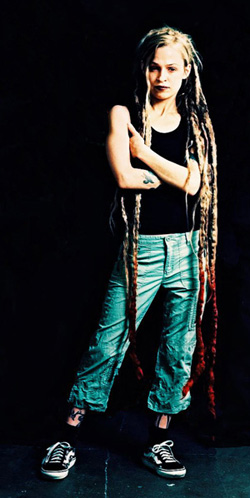 What was your reaction to Bush winning the ’04 elections?
What was your reaction to Bush winning the ’04 elections?
We were all really devastated. I think some of us kind of assumed that was going to happen. When you’re traveling through the States, you realize that there are so many people who are living in an isolated type of suburban environment. They’re really not educated. The only type of news they get is from their local news station, which, of course, is biased by who’s running that station, and they’re really not in touch with the rest of the world. It’s pretty obvious there’s a lot of ignorance in this country, and I think that that election just proves that. People are operating on a sense of fear. Not that there aren’t things to be scared of in the world: Things aren’t hunky-dory out there. The world has been in a state of urgency for quite a long time, but there are people who are more open to trying to understand why there are wars going on, why there is hatred, and that there are problems in the world and people shouldn’t be scared to look inward and inside of their own country’s politics to realize why those events may be happening.
Crisis, for example, is a band made of people from different parts of the world, and we’re really very different people, but we make it happen, we get along, and not only do we just get along, we love being around each other. The election made us feel really devastated, because I don’t think President Bush has the capacity to bring the world together. He’s on his own, self-appointed, religious or moral crusade, and it’s all about divide and conquer, and I really don’t see any of that Christian love going out there trying to heal the problems of the world.
Crisis is a pretty dark band: Would you say that in the music and lyrics there’s a light at the end of the tunnel? There’s definitely a light at the end of the tunnel, for all of us. That’s the important part about our music: It’s journey, it’s a sense of discovery, which is why, in our songs, I like to use symbolism. We’re never going to preach exactly what we’re saying. Creating music, for us, is a discovery, and the discovery is all about diving into that darkness, it’s about being very emotionally open, which is a scary thing sometimes, especially in a room full of other people. But along that journey, if you choose to embrace it, you’re diving into the darkness and there’s a light at the end of the tunnel. There’s a sense of catharsis that comes from being able to conquer your own demons or connect with other people and create something positive.
Lyrically, I tend to target people I would consider enemies or enemies of the people, but there’s always a light at the end of the tunnel. Part of that is the self-exploration we ask our listeners to get involved in. We’ve kind of decided that, as a band, we don’t really fit into a genre, but our place in the world is just to make people think. What you get out of it is what you put into it: How open are you willing to be?
Do you think that to communicate with other people you have to open yourself up to vulnerability? If so, then you are also open to attack...
Sure, and that’s the whole scary part of operating in this world. Speaking from a personal point of view, before I was in Crisis, the way I responded to people in social situations was very defensive. I’d have my walls up, and my words of weapons ready if someone were to insult me or try to make me look like a fool or do something that I thought was disrespectful. The problem with operating that way is that not only are you closing the negative things out, but you’re closing yourself off to some positive experience as well. Being a student requires being open, and dropping some of your own idealisms along the way. It doesn’t mean not having a strong sense of self, or not believing in what you believe in wholeheartedly, but in order to learn and really get along with people, you have to have a sense of openness. I think it’s absolutely necessary.
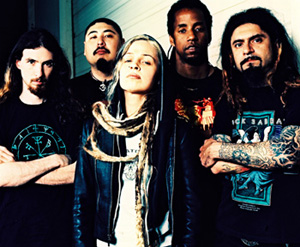 Those words could be applied to the personal as much as to the situation of America.
Those words could be applied to the personal as much as to the situation of America.
Absolutely. America’s government and your mass group of people are definitely not open right now. They’re not open to understanding the most common thing, which is “Why do people hate us?” It’s really not that hard to understand how poor, oppressed people could be angry by the things done to them by people who aren’t even from their own country. It requires being a bit of student, without emotions involved, trying to learn the facts, and then trying to put yourself in their shoes, which is a very simple idea, and it really works.
You’ve talked about the opportunities: What burdens does being an artist entail?
Some of it is self-imposed. What comes with it is a sense of vision, which can be difficult. In Crisis’ example, we’re all angry people, and our anger is part of who we are. It colors the way we see the world, and maybe because of that, we see things that we don’t agree with like disrespect, injustice, closed-mindedness, racism, and sexism. I feel like maybe my eyes are more open to it, and with that comes a sense of responsibility to do something, to fight against it. Maybe it’s not so much a burden, but sometimes it’s a weight on your shoulder and you’re like “Am I taking things too seriously?” It’s who we are, it’s what we do, and we’re constantly on that quest, what we feel is our battle in life.
How does it feel to be back after so many years?
It’s awesome. I mean, we didn’t stop making music together, but Crisis did stop for a while. When we started up again, it was because we felt we really needed to do it. It’s home for us. It’s a language we created, and we missed it while it was gone. We’re so energetic and so excited, the music was just bursting out of us, and we really didn’t have any expectations. We’d been gone a while, we may not find a label again like before, but we never had support in the industry before, so we’re just happy to jam.
(www.theendrecords.com)

